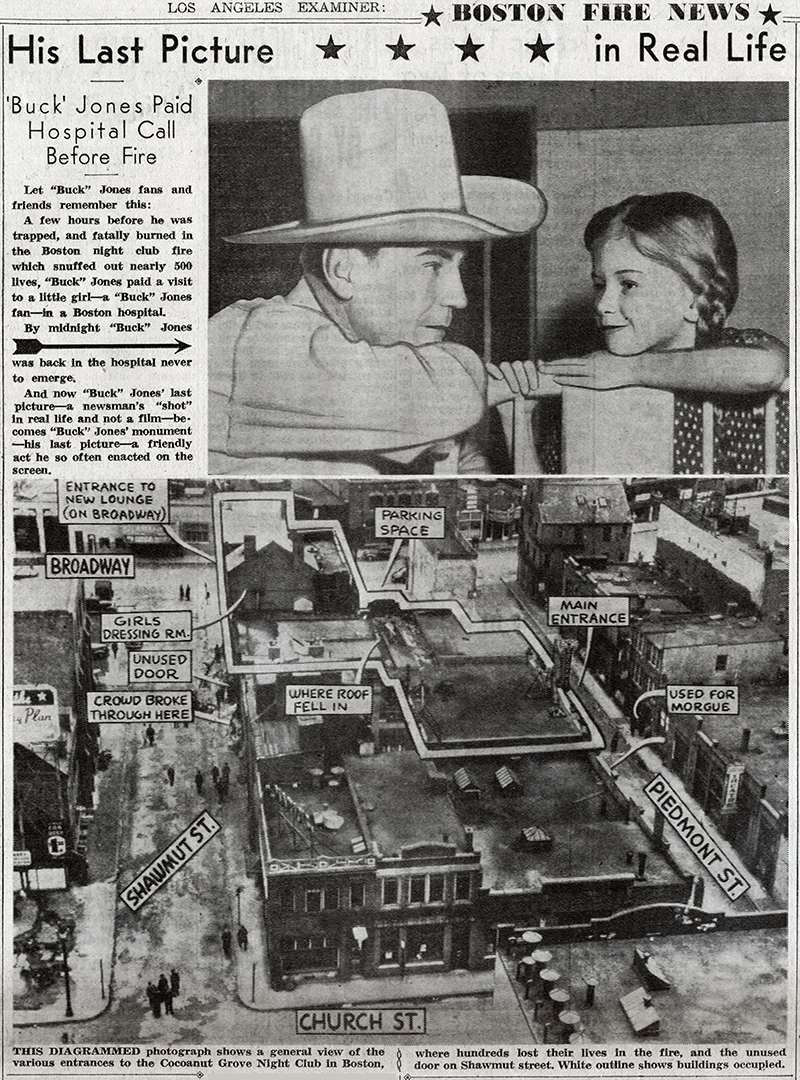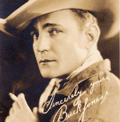|
|

Los Angeles Examiner.
Monogram Star Buck Jones Dies in Cocoanut Grove Fire; Bonelli Seeks Midnight Liquor Curfew.
Los Angeles, California | Tuesday, December 1, 1942.
|
Buck Jones Idol of Boys for 20 Years. Boyhood Spent on Oklahoma Ranch Leads to Star Roles as Western Hero. Epitome of the "real" West to American youth for more than 20 years, Charles "Buck" Jones, the big, bluff, likable movie cowboy, died yesterday in Boston of burns suffered in the night club holocaust there. One of the film industry's outstanding Western stars and veteran of more than 200 films, Jones rocketed from a $5-a-day extra at the old Universal Studio to a $2,500-a-week star with a tremendous following, especially among young boys. His fan clubs once numbered nearly 5,000,000 members. He was born Charles Frederick Gebhard at Vincennes, Ind., December 4, 1894, but spent his boyhood on a 3,000-acre cattle ranch near Red Rock, Okla. There, among the cowhands in his father's employ, he became as proficient in riding and roping as the professionals. Advanced to Stardom. It was these well-learned skills that elevated him to movie stardom after an apprenticeship spent doubling for such luminaries as Tom Mix, William Farnum and William S. Hart. Jones packed as much adventure into his real life as was crammed into his Western thrillers, in which right always prevailed. He enlisted in the Army in 1910 and saw service on the Mexican border with the Sixth U.S. Cavalry. From there he was sent to the Philippines and was stationed in Mindanao, home of the fiery Moros, where he was wounded and sent home. Later he was assigned to an aviation squadron, in which he flew the first planes purchased by the Army. Signed with Circus. Capitalizing on his talents as an exhibition rider and roper, Jones signed up with a circus, where, in 1915, he married a fellow performer, Odelle Osborne, who survives him. They had one daughter, Maxine, now the wife of Noah Beery Jr. He and his bride came to California in 1917 with Ringling Brothers Circus, but he quit here to take his first motion picture extra role. From then his rise was meteoric. In recent months Jones had been recalled from semi-retirement by Monogram Studios, for whom he instituted a new series of "horse operas," known as "The Rough Riders." The latest of his pictures to be released by Monogram included "Dawn on the Great Divide" and "West of the Law." Jones had been unconscious since he was taken from the blazing night club Saturday night with severe burns about the face and throat.
Two L.A. Men Die in Boston Blaze. Two Los Angeles men were killed in the Boston night club fire Saturday, revised death lists showed yesterday. Marvin Katzman, 25, yell leader last year at the Los Angeles campus of the University of California and president of Phi Lambda Pi fraternity, was burned to death, and Maximo Coleman, Hotel Bradford, died yesterday of his burns. Several Eastern film executives, familiar to the Coast, also were listed as dead. They included Eddie Ansin, president of the Interstate Theaters Corporation; Philip Seletsky, chief film booker for the M. and P. Theaters of Boston, and Mrs. Seletsky; Charles Stearn, manager of United Artists Corporation; Fred Paul Sharby Sr., and his son, Fred Jr., of Keene, N.H., showmen; Eugene Goss of Cambridge, a former associate of Cecil B. De Mille; Harry Asher of Boston, president of Producers Releasing Corporation. Early reports also included the name of Hal Horne, Disney representative in New York. It was pointed out that this was not the Hal Horne who is New York publicity and advertising head of 20th Century-Fox. Katzman, son of Max Katzman, 1573 West 39th street, was enrolled at Harvard University Business Engineering School, and was a graduate here of Manual Arts High School and Virgil Junior High.
Girl Saves Leopard Skin Muff; Shoes, Stockings Lost. BOSTON, Nov. 30. — (AP) — The "eternal, feminine" instinct of cherishing pretty things exhibited itself in the midst of the panic of the Cocoanut Grove holocaust in which at least 440 persons perished. Pretty 21-year-old Joyce Spector of Boston, who suffered burns, told today how she clung to a new leopard skin muff as she crawled under chairs and tables to safety. In the confusion she was separated from her escort, Justin Morgan of Cambridge, listed as missing. "I didn't have any stockings or shoes left on," she related as she lay on her bed, her face and hands blistered, her hair singed. "That was from everyone trampling and pushing, while I was crawling along the floor. But I had hung onto my leopard muff. My skirt was most burned off."
Ironic Twists Save Lives of 3. BOSTON, Nov. 30. — (AP) — The birth of a baby, the flip of a coin, and a wife's persistence were among the ironies which saved a number of persons from possible death or serious injury in the Cocoanut Grove fire, which claimed nearly 500 lives. Dr. Vincent M. Sena of Somerville was just about to leave his office to meet a friend at the night club when he received a rush call — and he was delivering a bouncing baby boy at Somerville Hospital when the fire broke out at the Grove. Miss Allison Smith of Brookline said she and her escort, undecided whether to go dancing at the Grove or at a hotel, tossed a coin — and the hotel won. And S.H. Rosenberg, also of Brookline, declared that when he and his wife started out for a night's entertainment with a group of friends, "everybody but my wife wanted to go to Cocoanut Grove — she wanted to go to the Mayfair." "She held out and won," he said, "and without question probably saved our lives."
City Orders Survey of Clubs to Avert Any Disaster Here. With the horror of the Boston fire fresh in their minds, city officials yesterday began making certain that "it can't happen here," with these speedy actions: 1. Demand that an immediate survey of Los Angeles cafes, night clubs and theaters be made to insure public safety, particularly in the use of inflammable "party" decorations, was sounded in the City Council. 2. Fire Chief John H. Alderson declared he would instruct his fire prevention squad to crack down on cafe and night club owners using illegal draperies or decorations which might burst into flame. 3. City Building Superintendent G.E. Morris instructed his inspectors to make an immediate check of all night clubs, bars and theaters to make certain that city building laws are being followed as to entrances, exits and the use of revolving doors. Councilman Roy Hampton introduced the resolution asking that the survey cover all places of amusement "to insure full public protection." Fire Chief Alderson asserted the use of inflammable decorations and hangings has been outlawed for many years. "However," he said, "I am instructing my fire prevention squad to be particularly vigilant during this holiday season and to make doubly certain no decorations are used which might easily be ignited."
laexaminer19421201: Download individual pages here. Newspaper purchased 2019 by Leon Worden.
|
Bio/Story 1966
Tobacco Card 1920s
Tobacco Card, Portugese Colonies, 1928
The Avenger 1931
One Man Law 1932
FULL MOVIE
Outlawed Guns 1935
FULL MOVIE+
Stone of Silver Creek 1935 (Mult.)
"Black Aces" 1937
Walker Cabin
Boss of Lonely Valley 1937
Buck Jones Club Badge 1937
Forbidden Trail 1941
FULL MOVIE
Rough Riders 1942
Rough Riders 1942
Down Texas Way 1942
Ghost Town Law 1942 (mult.)
West of the Law 1942
Last Photo 11/28/1942
Dies in Cocoanut Grove Fire
|
The site owner makes no assertions as to ownership of any original copyrights to digitized images. However, these images are intended for Personal or Research use only. Any other kind of use, including but not limited to commercial or scholarly publication in any medium or format, public exhibition, or use online or in a web site, may be subject to additional restrictions including but not limited to the copyrights held by parties other than the site owner. USERS ARE SOLELY RESPONSIBLE for determining the existence of such rights and for obtaining any permissions and/or paying associated fees necessary for the proposed use.





















